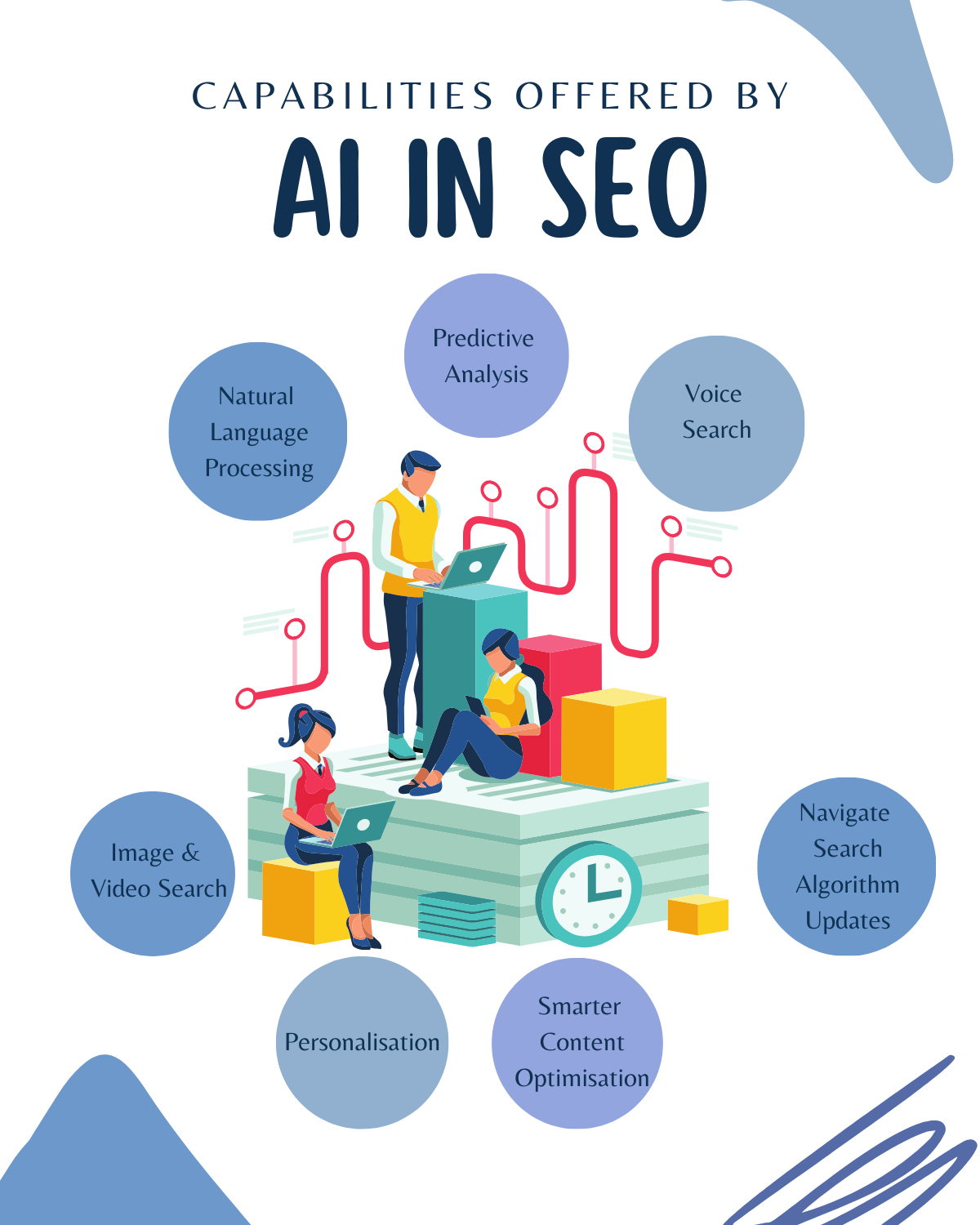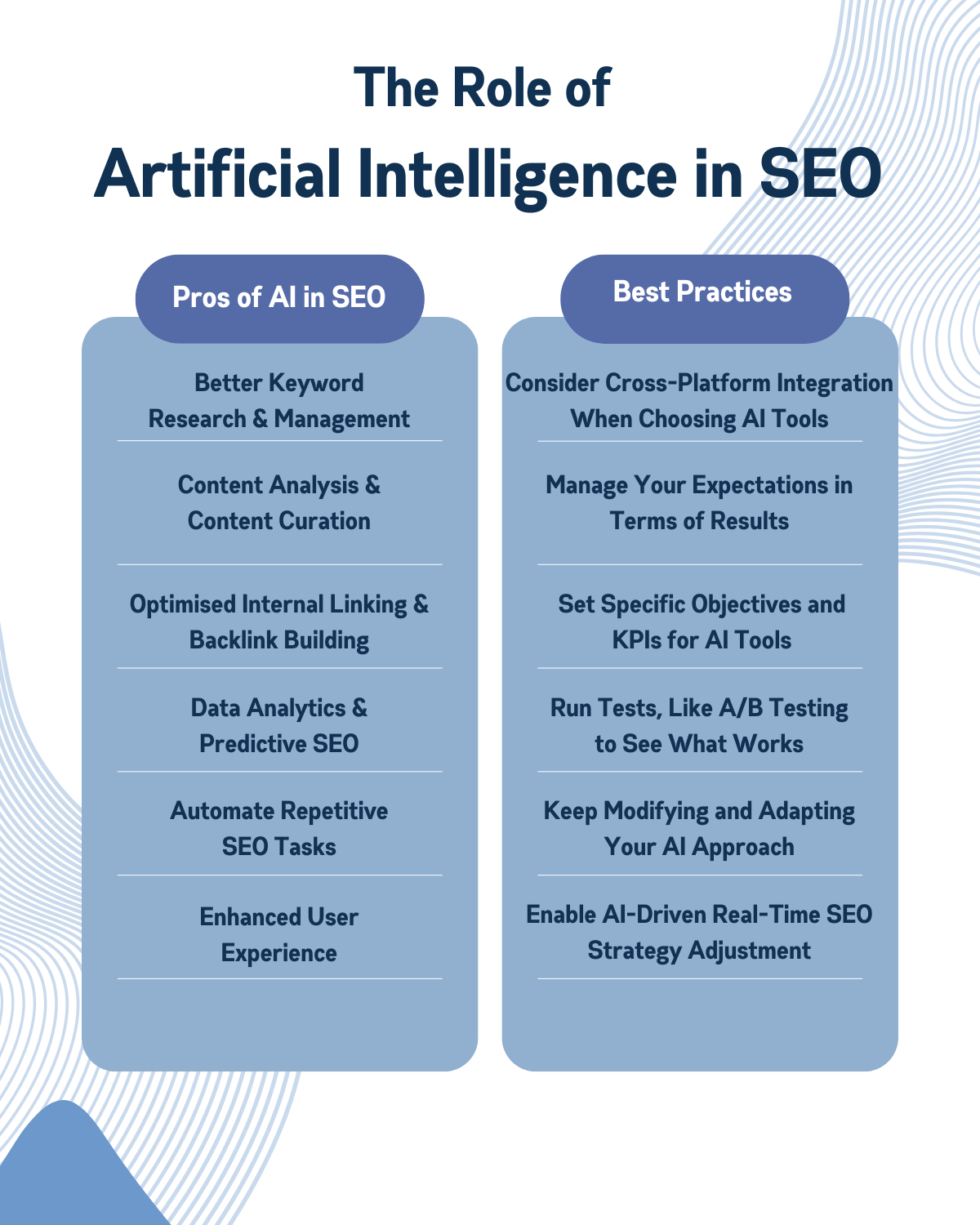Search engine optimisation (SEO) is not a one-time fix; never has been. It’s a long-term effort in which SEO strategies must be regularly updated to adapt to the constant changes in the search algorithms of different search engines. With the emergence of new technologies, the aim of these search engines is to ensure seamless user experiences along with relevant and high-quality search results. The advent of Artificial Intelligence (AI) in SEO is a new frontier. The integration and improvement of AI in search engine operations has been advancing with every passing year which, in turn, has been influencing search engine rankings. Hence, SEO strategies too have to focus on natural language and user intent now along with a keyword-based approach.
What Is Artificial Intelligence?
Artificial intelligence is a set of technologies that facilitate computers and machines to simulate problem-solving capabilities and human intelligence. Artificial intelligence is an umbrella term for a range of technologies, including machine learning, computer vision, and natural language processing, which can analyse data from multiple sources, identify patterns, autonomously solve challenges, and support informed decision-making. With the capabilities on offer, AI-driven tools are increasingly being adopted in the business and marketing landscapes. AI can also be used to automate time-consuming and repetitive tasks, which allows you to focus more on strategic ideation and high-value tasks that require critical thinking, strategic decision-making, and creativity.
How AI Is Shaping SEO

The adoption of artificial intelligence in SEO practices is not a fleeting trend but a fundamental shift in how brands and marketers optimise for search engines. Ai has brought about a revolution in SEO and how websites are ranked in search results. Earlier, SEO relied heavily on keywords, even resorting to black hat practices like keyword stuffing to manipulate Search Engine Result Page (SERP) rankings.
However, the more sophisticated and smarter AI-powered algorithms go beyond keywords and consider several factors, such as relevance of content, context, and user engagement, making for a more user-centric approach to SEO. AI in search engine optimisation involves the use of advanced machine learning and natural language processing algorithms that have the ability to process and analyse large sets of data in quick time. AI SEO optimisation helps professionals better understand user behaviour and search engine algorithms. The emphasis of AI SEO optimisation is on high-quality content creation that adds value. AI has also helped significantly in reducing spam in search results, improving their overall quality. Today, websites that use black hat SEO techniques can be detected and penalised by AI algorithms, levelling the playing field for websites that stick to ethical SEO practices.
It is important to remember that artificial intelligence in SEO does not replace human effort but complements it, unveiling optimisation opportunities and providing insights that may be challenging to identify manually. AI SEO optimisation has transformed how search engines interpret and process information, making it crucial for SEO professionals to keep up with the latest advancements in AI, so they can adapt their strategies to rank well in SERPs. With the continuous evolution of artificial intelligence in SEO, the future of digital marketing is all set for an upheaval.
The Role of Artificial Intelligence in SEO

- Industry Research: AI SEO tools can identify shifts in consumer behaviour and market trends efficiently. Leveraging AI tools for industry research offers a strategic edge ensuring that your SEO strategies are always in line with the latest market dynamics.
- Competitor Research: Gain insights into what your competitors are doing, what works for them and what doesn’t. Don’t just keep up with the competition, stay ahead of them utilising the insights offered by AI-driven competitor research.
- Keyword Research: Uncover relevant, high-performance keywords, predict keyword trends, and target the right keywords effectively. AI SEO tools provide you with optimised keywords that can drive more traffic and conversions.
- Content Clusters: AI SEO optimisation tools can map the main industry topics that your website should cover and create content clusters to group related content. Ensure that your website is comprehensive, well-organised, and authoritative and improve your SERP rankings.
- Content Audit: Identify gaps in content, highlight missing or outdated information, and uncover opportunities for optimisation. Use the insights provided by AI tools to refine your content strategy and gain a competitive edge.
- Content Outlines: AI SEO tools can generate detailed content outlines and suggest the best structure for your content based on insights derived from keyword and competitor research. AI can help you create high-quality, SEO-optimised content that addresses the needs of the audience effectively.
- Content Creation: AI SEO tools come with advanced natural language processing capabilities, which allow for quick and efficient creation of content that is tailored to search intent and specific keywords. It is important to remember that AI-generated content requires oversight.
- Content Relevance: AI plays a significant role in content optimisation. AI SEO tools can predict content performance and suggest improvements.
- Internal Linking: AI tools can analyse the structure of your website and discover internal linking opportunities for distributing link equity across the site and enhancing the overall user experience.
- Image Alt Text: AI can be used to automatically generate SEO-friendly, descriptive alt text for your images, ensuring that the images too contribute to your overall SEO strategy.
- Meta Tags: Make compelling, keyword-based meta tags. AI can analyse page content to generate relevant meta tags that drive click-through rates. AI optimised meta tags that provide a clear and engaging summary encourage users to visit your website.
- Schema Markup: Use AI to generate schema markup that enhances the visibility of your website. AI automatically generates the necessary code and provides detailed information in search engine results to improve user engagement as well as SEO performance.
- Data Analysis: Leverage AI for data analysis for a comprehensive view of the performance of your website, keywords, and to understand user behaviour.
Our Recommendations
The role of artificial intelligence in SEO is only going to increase as technology creates a dynamic landscape for the future. To thrive in the AI-driven future, businesses must adopt a proactive approach and embrace the capabilities of AI. For empowering digital marketing teams to harness the benefits of AI, education and training play an important role. It is necessary to equip them with the necessary skills and knowledge required to leverage the full potential of AI. However, it is crucial to remember that in the context of designing and implementing SEO strategies, the importance of human creativity cannot be dismissed, even with the advancements in AI SEO optimisation. AI SEO tools can be used to automate tasks and mine data for insights, but they cannot yet replace the strategic thinking, creativity, and decision-making capabilities of the human mind. The best use of artificial intelligence in SEO is not in trying to replace human creativity but in trying to complement it.
High-Quality Content
High-quality content is more likely to be cited in the AI-generated results of search engines, like Google, so ensure that your content is engaging, informative, and well-researched.
- Conduct research using reliable sources.
- Avoid fluff and write clear and concise content.
- Update the content regularly with the latest information and trends.
- Add engaging headlines.
- Improve your content by incorporating user feedback.
Structured Data
Improve your chances of being featured in AI-generated overviews by implementing structured data that can help a search engine understand the context of the content.
- Add schema markup to your HTML.
- Jason-LD format allows for easier integration with search engines.
- Key elements, like events or articles, should be marked up.
- The Structured Data Testing tool by Google can help check for errors and validate structured data.
- Track the performance of structured data and its impact on visibility.
Citations and References
Another way to improve your visibility and credibility is by using citations and references from authoritative sources.
- Reference and cite well-known, authoritative, and credible sources.
- In-line citations can be used within the text to support the information being conveyed.
- At the end of your content, list all the sources in a references section.
- Add links to original research and studies wherever you mention data.
- Ensure all references are current and relevant by regularly updating citations.
Multimedia
Content with infographics, videos, and images is not only more engaging but also easier for AI to analyse.
- Embed multimedia in content within the text.
- Use high-resolution, relevant images.
- Complement your written content with informative videos.
- Represent data and concepts using infographics.
- Use alt text, descriptions, and captions to optimise your multimedia for SEO.
Voice Search
Optimise your content for conversational queries for AI-driven search engines that handle voice queries.
- Minic natural speech and use conversational language.
- Include FAQ to answer typical queries and common questions.
- Pay attention to long-tail keywords that users may speak rather than type.
- Include local keywords and information to optimise hyperlocal search.
- Answer user questions through how-to guides with step-by-step instructions.
Track and Modify
Monitor content performance in AI-driven search engines and adapt your approach based on what is working.
- Track performance using analytics tools, like Google Analytics.
- Keep an eye on your position in search results.
- Check metrics, like time on page and bounce rate, to assess user behaviour.
- Make changes to your content based on its performance data.
- Keep up with the latest trends in SEO and AI to stay ahead of the curve.
Frequently Asked Questions
- How is AI affecting SEO?
Artificial intelligence is affecting search engine optimisation in many ways. Offering advanced capabilities, AI facilitates personalised search results, automation of repetitive SEO tasks, data mining, content strategizing and creation, internal linking optimisation, meta tag and schema markup generation, and much more. With the integration of AI in SEO, search engine results have become more user-centric and intent-based.
- Can AI SEO tools help with website ranking?
Yes. AI SEO tools can be used for multiple purposes, including analysing your website content and structure, identifying gaps in content, competitor research, predictive SEO trends, keyword research, optimising content strategies, and much more.
- How is AI used in search?
The use of AI in search algorithms has ended the era of keyword stuffing, which is now being identified and penalised by AI-driven search algorithms. Now, the focus of search engines has shifted towards understanding user intent. AI has helped search engines evolve to understand the context behind a user’s queries. Keyword research still remains an important part of the SEO strategy but delivering relevant and valuable content has become the priority.
- Will AI replace SEO?
No. AI is a tool that has proven to be very valuable for SEO professionals, helping them streamline and optimise their strategies. AI is not expected to replace SEO, but it will surely transform it.
Bhuwanesh is a Strategic growth marketer with 15+ years of experience in conceptualising digital marketing activities for B2B and B2C industries like EduTech, E-commerce, Manufacturing, Travel, and Real Estate. He has helped businesses increase leads and sales significantly up to 500%, by implementing different growth hacking techniques.






Leave a Comment